Ordinarily, I would object to having candidates interviewed in a talk show format rather than in a debate format where they can challenge each others views. However, there is a specific concern that queers are stuck with trying to ascertain in presidential candidates:
How comfortable are they with us and being around us?
This may sound shallow, but it reflects political reality. Bill Clinton's painfully obvious discomfort with us and even talking about us made it even more difficult for us to challenge the military ban while he was president. Our chances of getting meaningful results on queer issues will be enhanced with a politician whose comfort with us leads the general public to be less uncomfortable about progress on our legislative priorities.
The talk show format was a strenuous test for most heteros and it should have been. Very few heteros, much less hetero politicians, have been in a room surrounded by queers, with few or no straight people. The absence of the other candidates in the room made it an even more difficult test.
How did they do?
1. Dennis Kucinich: Not only was Kucinich great on queer issues, he was comfortable and genuinely happy to be there. Part of it had to do with the fact that he was with an audience that agreed with him on the issues being debated, of course. But, being able to see queers primarily as a friendly audience of people he likes puts him miles ahead of most politicians. Kucinich was engaged with the audience in a way no other candidate came close to demonstrating. He made sure to look at people sitting in all parts of the room, empathizing with people who got less desirable seats and their natural desire to feel included.
2. Barack Obama and Mike Gravel (tie): Both of them were at ease in the setting and happy to be there. They weren't as engaged as Kucinich, but that says more about Kucinich than anything else. They even were able to relax and be themselves as hetero minorities in a queer environment.
4. John Edwards: He was occasionally awkward around queers, even squirming a bit in his chair, but he obviously was moved by the going to the queer center in L.A. and seeing that queer youth who were kicked out of their homes. I think this may genuinely change his view on queer people as individuals and make him a better person.
5. Hillary Clinton: She often was stiff and very tense around the panelists and tried to ignore the audience except when she was using one of them as a prop. She had a disdainful attitude that suggested she felt she was entitled to our lowly support, regardless of what she had done or might do in the future. Clinton's smile showed more hostility than warmth. She also seemed to think we were gullible and would fall for the weakest spin on issues such as “Don't Ask, Don't Tell.” She showed a Bush-like inability to acknowledge mistakes. The best that could be said was that she showed up and did not say anything overtly homophobic.
6. Bill Richardson: He is an oddity. The abstract idea of lgbt equality obviously is more important to him than his visceral dislike and discomfort being around people who are not heterosexual. His performance and the reactions to it said a lot about him, American society, and the queer community.
What about the Democratic no-shows?
The absence of Dodd and Biden was disturbing to say the least. One would think that trailing candidates would have a strong incentive to show up to a forum with a large national audience of Democratic voters. Obviously, their issues with homosexuality trumped political expediency.
What about the Republicans?
The refusal of every Republican to accept an invitation to attend a similar event by the same sponsors speaks volumes about just how fanatical the homophobia is in that party.
Psycho Woman Throws Knives At Children
14 years ago











I watched the "Debate", and your take on it is impeccable, Bro.
They all did a 'bang-up' job.
Thanks for the Str8 talk...
Peace,
=RD=
I was floored when I heard that Clinton would actually KEEP the "Defense of Marriage Act" and repeal only "part 3" but for the life of me neither myself or others could find the "part 3" she was talking about. My partner still supports her and thinks she playing the middle ground for votes and said that we need to think about what would happen if DOMA were repealed. She said that states such as Indiana would end up scrambling to pass anti-gay legislation when DOMA is the thing that keeps them from being able to pass it now. It's their fail-safe by saying "we don't need one because DOMA keeps us from needing it." Which I understand. But still, voting for anyone who only wants to give us a few rights and not all of them is settling. I realize we all have to settle now and then. Either way, Kucinich has my vote for now.